 Politics
Politics
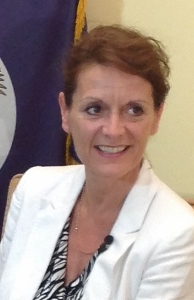
New governor expected first week of September
 (CNS): The Cayman Islands new governor, Helen Kilpatrick, is scheduled to arrive in the country on the morning of Friday 6 September. The first British bureaucrat from outside the Foreign Office and the first women to take up the post, Kilpatrick is a finance expert and is expected to focus heavily on the public purse during her tenure. Kilpatrick will be sworn into office at the Legislative Assembly at 2:00 on the afternoon of her arrival, before she settles into the Seven Mile Beach house where she will live for the next three years. Kilpatrick, who is taking up her first overseas posting on behalf of the UK government, has said that she does not believe that her lack of FCO experience will be a hindrance in her new job.
(CNS): The Cayman Islands new governor, Helen Kilpatrick, is scheduled to arrive in the country on the morning of Friday 6 September. The first British bureaucrat from outside the Foreign Office and the first women to take up the post, Kilpatrick is a finance expert and is expected to focus heavily on the public purse during her tenure. Kilpatrick will be sworn into office at the Legislative Assembly at 2:00 on the afternoon of her arrival, before she settles into the Seven Mile Beach house where she will live for the next three years. Kilpatrick, who is taking up her first overseas posting on behalf of the UK government, has said that she does not believe that her lack of FCO experience will be a hindrance in her new job.
She said the position as governor would build on her previous experience in local government, in the Home Office, in policing and prisons. "Although working in the Foreign Office is new to me, the areas of responsibility I will have here are not new,” she told the press during a brief familiarization visit in July.
She said her financial experience would be a great help, as it was an “important aspect of government and an import aspect of business life in Cayman."
Kilpatrick said her first impressions of the Cayman Islands were “absolutely fantastic”, as she described the welcome as friendly and said everyone had been very open with her. She arrives in Cayman directly from her former Home Office job.
Her predecessor, Duncan Taylor, said the job of governor is different from other diplomatic roles and comes with significant powers and responsibilities. He said Kilpatrick’s experience managing local government budgets and overseeing the administration of police forces and other such jobs at the Home Office would be beneficial.
As well as helping to get the public purse back in semblance of order, Kilpatrick will need to focus on what many believe is the islands' costly and over bloated civil service, but without cutting local jobs. Before he left, Taylor said that he was disappointed that he had not been able to advance issues of accountability and transparency in the service and noted that this remained a pressing issue.
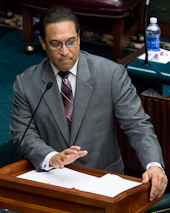
UK approves PPM’s new plan
 (CNS): A revised four year plan submitted to the Foreign and Commonwealth Office by the Cayman Islands Government earlier this month has been approved, the premier’s office revealed in a statement Tuesday. The UK's overseas territories minister, Mark Simmonds, wrote to Alden McLaughlin last Thursday giving his approval for the plan, which the government said it had submitted on 15 August. However, few details have been revealed or how it differs from the plan submitted by the previous government. The premier’s office did state, however, that there were no new borrowings and the plan included continued repayment of existing loans and zero inflationary revenue measures.
(CNS): A revised four year plan submitted to the Foreign and Commonwealth Office by the Cayman Islands Government earlier this month has been approved, the premier’s office revealed in a statement Tuesday. The UK's overseas territories minister, Mark Simmonds, wrote to Alden McLaughlin last Thursday giving his approval for the plan, which the government said it had submitted on 15 August. However, few details have been revealed or how it differs from the plan submitted by the previous government. The premier’s office did state, however, that there were no new borrowings and the plan included continued repayment of existing loans and zero inflationary revenue measures.
According to a statement, government is the “facilitator of economic growth through its support for various private sector initiatives” but it does not propose any major capital expansion programmes, revenue measure or “silver bullets” to be successful. The plan will be unveiled when it presents the 2013/14 full year Budget in late September.
McLaughlin said he welcomed the UK’s approval of the plan after its first submission and that it would see an end to the anxiety that had been associated with the preparation of the country’s budgets during the UDP administration.
“It demonstrates the positive results that can be achieved when processes are followed and a logical, credible and consultative approach is taken toward fiscal planning,” McLaughlin said.
“I am extremely pleased that we are able to put behind us the uncertainty and anxiety that has attended the budget process over the past four years. The country now has a four-year plan that provides certainty and stability to the government’s future fiscal planning and provides challenging but realistic targets,” he said.
The CIG would now be able to look long-term at plans and projects rather than having to focus on short-term, short- sighted plans, he added.
McLaughlin said government had not talked publicly about the work to develop the plan but itwas a culmination of weeks of meetings between the elected government, the finance ministry and key stakeholders across the entire public sector.
“From those meetings, a fiscal plan was devised that is credible, sustainable and provides the necessary trajectory for us as a country to meet the fiscal targets outlined in the Public Management and Finance Law,” the premier added, as he thanked Finance Minister Marco Archer and his team for their diligent and hard work.
The plan, which has been given the OK by the British government well ahead of government’s presentation of the full 2013/14 Budget set for the end of next month, outlines Cayman’s global fiscal targets for the next four budget years and the strategies that will be employed to achieve them and gain compliance with the fiscal ratios contained in the Public Management and Finance Law (2012 revision), officials indicated.
With an initial aggressive reduction in public sector operating expenditure, the plan sets out significant increases to government’s cash reserves, no new borrowings, continued repayment of existing loans and zero inflationary revenue measures.
The premier’s office said that Simmonds welcomed the commitment to fiscal planning and to achieving the key debt ratios agreed in the Framework for Fiscal Responsibility by the end of the financial year 2015/16. He also approved the top-down multi-year approach to fiscal planning taken by the government, which he believes will be a powerful tool for sustainable public expenditures and revenues.
“Based on this level of detail planning, the UK was able to approve the Plan on its first submission, which is a testament to the hard work that was put into its development,” the premier’s office stated.

Lawyers focus on intent
 (CNS): The appeal filed in the court, Friday on the chief justice’s decision regarding the election of Tara Rivers focuses on the intent of the constitution and the interpretation of the words in it. John Gordon Hewitt, who is challenging Anthony Smellie’s decision that Rivers is qualified, is asking for a declaration from the Cayman Islands Court of Appeal for the true spirit, meaning and intent in the constitution regarding residency and the holding of a foreign passport. Following the news, Rivers told CNS that her lawyers were dealing with the attempt to appeal but she was focusing on what she was duly elected to do, "which is to represent and serve the people of West Bay and the Cayman Islands, and to work towards finding solutions to the myriad of complex issues facing the country.”
(CNS): The appeal filed in the court, Friday on the chief justice’s decision regarding the election of Tara Rivers focuses on the intent of the constitution and the interpretation of the words in it. John Gordon Hewitt, who is challenging Anthony Smellie’s decision that Rivers is qualified, is asking for a declaration from the Cayman Islands Court of Appeal for the true spirit, meaning and intent in the constitution regarding residency and the holding of a foreign passport. Following the news, Rivers told CNS that her lawyers were dealing with the attempt to appeal but she was focusing on what she was duly elected to do, "which is to represent and serve the people of West Bay and the Cayman Islands, and to work towards finding solutions to the myriad of complex issues facing the country.”
Challenging all of the CJ’s findings as well as the block on appeals regarding election challenges, Hewitt and his lawyers claim that there is nothing to suggest that the framers of the constitution meant that residency could be in more than one place at once or that the document provides for any legislator to have allegiance to another power.
It claims that the chief justice applied a “generous and purposive” interpretation of the word and not their normal meaning in order to arrive at his decision. The lawyers say that in his ruling he committed grave and serious errors in law by the way he interpreted the meaning of the constitution in several places and, as a result, failed to give Hewitt a fair hearing.
The appeal implies that CJ Smellie failed to apply the proper rules of construction and arrived at conclusion without evidence to support them. Local attorney Steve McField, who has filed the appeal on behalf of Hewitt, said they hoped the appeal would be heard at the constitutional position that the Grand court has the last word on election petitions.
As a result of the position by Hewitt and his legal team that the errors made by the CJ are constitutional and of great public importance, McField believes that the appeal can be heard and that appeals concerning the interpretation of the constitution cannot be ousted. Regardless of the constitutional provision in section 66, the appeal claims that this is a questioning of errors and misapplication and not an appeal on the direct election of Rivers.
As the appeal claims that Cayman’s top judge sought to justify his decision not on the basis of law and legal precedent but byapplying this “generous and purposive” interpretation to what the lawyers say are unambiguous words, he failed to give them their ordinary meaning.
In short, the appeal claims that in regards to the residence of a potential candidate, the constitution clearly means that they should be resident here and not anywhere else, and physically present in the islands and living here. It notes that the exception for a student at an educational establishment does not mean a full time employee of a law firm who is doing some professional training. The appeal also claims that holding a foreign passport does mean that the candidate has an allegiance to another power by using it.
There are noguarantees that the appeal will get past the major hurdle in the constitution that elections issues must be decided locally and the CICA may simply dismiss the leave to appeal, despite claims by McField that if the judge is wrong in law, the right to appeal cannot be blocked.
See both a copy of the appeal and the CJ’s ruling on the election petition below.
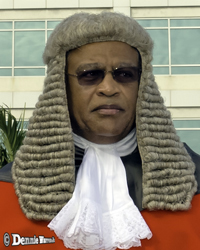
CJ spends $360k to clarify power of JLSC
 (CNS): A Freedom of information request has revealed that the chief justice has so far spent $360,799.22 on legal fees from the court’s budget seeking a ruling regarding the power of the Judicial and Legal Services Commission (JLSC) established under the new constitution. Anthony Smellie filed a petition last year seeking clarity on the powers of the JLSC in relation to the appointment of judges past retirement age, disciplinary procedures and the general impact the commission has on the critical issue of the indpendence of thejudiciary. But the UK court declined to hear the petition and handed the case back to Cayman’s Grand Court, suggesting that was the appropriate place for the first hearing.
(CNS): A Freedom of information request has revealed that the chief justice has so far spent $360,799.22 on legal fees from the court’s budget seeking a ruling regarding the power of the Judicial and Legal Services Commission (JLSC) established under the new constitution. Anthony Smellie filed a petition last year seeking clarity on the powers of the JLSC in relation to the appointment of judges past retirement age, disciplinary procedures and the general impact the commission has on the critical issue of the indpendence of thejudiciary. But the UK court declined to hear the petition and handed the case back to Cayman’s Grand Court, suggesting that was the appropriate place for the first hearing.
Following the decision, Chief Justice Anthony Smellie explained that the aim of his petition was to bring local provisions for judicial tenure and discipline in line with standards in the United Kingdom as a means of safeguarding the independence of the judiciary.
“Great care will need to be taken as the next steps are explored,” the chief justice said, noting that having the matter resolved before the Privy Council would have been quicker, simpler and less costly than dealing with it locally because the matter may end up back with the Privy Council on appeal after it winds its way through the local court system.
The FOI request also revealed that Justice Alex Henerson, who continues on contract at present beyond the 60 years retirement age of other civil servants, as is common among the judiciary, currently earns CI$16.570.18 per month plus health and pension benefits.
See details of FOI request below.

Hewitt appeals CJ’s ruling
 (CNS): Lawyers representing the petitioner who challenged the election of Tara Rivers to her West Bay seat have filed an appeal, despite indications in the constitution that the local Grand Court has the final word on challenges to elections. The lawyers pointed to what they say are at least nine “serious errors” by Chief Justice Anthony Smellie in his judgment last month. Therefore, John Hewitt, the husband of Velma Hewitt, who ran as a UDP candidate against the Coalition for Cayman member but lost, is asking the Cayman islands Court of Appeal to review the arguments. Hewitt is asking for clarity on both Rivers’ US citizenship and passport and the finding that Allen & Overy law is an “educational establishment”.
(CNS): Lawyers representing the petitioner who challenged the election of Tara Rivers to her West Bay seat have filed an appeal, despite indications in the constitution that the local Grand Court has the final word on challenges to elections. The lawyers pointed to what they say are at least nine “serious errors” by Chief Justice Anthony Smellie in his judgment last month. Therefore, John Hewitt, the husband of Velma Hewitt, who ran as a UDP candidate against the Coalition for Cayman member but lost, is asking the Cayman islands Court of Appeal to review the arguments. Hewitt is asking for clarity on both Rivers’ US citizenship and passport and the finding that Allen & Overy law is an “educational establishment”.
The appeal also addresses section 66 of the Constitution on the basis that the original petition challenges referred to constitutional not election law issues, calling for a need for the CICA to intervene as constitutional interpretation must remain open to appeal.
Check back to CNS later for full details of the challenge.

Government to address 4 years of budget changes
 CNS): The PPM government has called a meeting of the Legislative Assembly next week in order to address a number of issues, in particular the appropriation changes over the last four years which were not addressed under the UDP administration. The meeting is set for Wednesday, 4 September, when Finance Committee is expected to regularise the back appropriations for fiscal years 2009/10 through 2012/13. The UDP Government increased its budget for the 2011/12 fiscal year alone by nearly $50 million through supplementary appropriations that were never approved.
CNS): The PPM government has called a meeting of the Legislative Assembly next week in order to address a number of issues, in particular the appropriation changes over the last four years which were not addressed under the UDP administration. The meeting is set for Wednesday, 4 September, when Finance Committee is expected to regularise the back appropriations for fiscal years 2009/10 through 2012/13. The UDP Government increased its budget for the 2011/12 fiscal year alone by nearly $50 million through supplementary appropriations that were never approved.
The Public Management and Finance Law requires that supplementary appropriation bills be brought to the Legislative Assembly for the particular fiscal year in which the changes are made. However, none have been brought to the House since 2009.
In addition, regarding an issue that has become a matter of controversy for the PPM, government also plans to elect a member of the opposition to fill a vacant seat on the Public Accounts Committee. The seat was vacated recently by Bodden Town PPM member Alva Suckoo following the decision of Coalition for Cayman member of the legislature, Roy McTaggart, to join the government back bench, thus unbalancing PAC in government’s favour.
Suckoo reportedly stepped down to allow a member of the opposition to be appointed, which would return the political balance of three government members and two opposition MLAs. At present, the only non-government member is Leader of the Opposition McKeeva Bush after both independent members, Arden McLean and Ezzard Miller, were rejected by the government benches.
However, the recent swearing in of the two C4C members as temporary Cabinet members has raised legitimate questions about their continuing membership of the committee, which should be composed of non-executive members. Although government has denied that the appointment as temporary members of Cabinet will have any impact because the work of PAC over the next few months will focus on the previous administration, others have noted that it is not their political affiliation but their elevated position to the top table of government while also serving on a standing committee which bucks the usual parliamentary procedure.
McKeeva Bush, the UDP leader, said it was a “very poor excuse” and that during the previous PPM administration they had made the same excuse with very poor results.
“Unfortunately for good governance, the PPM made the same excuse between 2005-2009 when one of their members chaired the PAC and it was dominated by them,” he recalled.
“Accordingly, what happened was that none of their accounts for that time got audited. By the time the new PAC was appointed, the present auditor general wanted to say most, if not all, of those years' accounts were irrelevant and a waste of time and money to audit. Even though his predecessor Dan Duguay had said there was over $60 million that was unaccounted for in one of the PPM ministries.”
Bush said the idea that PAC was looking at reports based on the former administration was simply no excuse for the premier “in the face of what is right and proper for good governance” to appoint for government ministers and or councillors, such as McTaggart and Connolly, to the committee. Had he been at the helm of government and this happened, he would have been widely criticised,Bush said.
When the House meets 4 September, Deputy Speaker Anthony Eden will preside over the session as Speaker Juliana O’Connor-Connolly will be overseas on one of her oft criticised jaunts for the Commonwealth Parliamentary Conference. For this year’s conference O’Connor-Connolly will be travelling to Johannesburg, South Africa, where she will be from 28 August to 6 September.
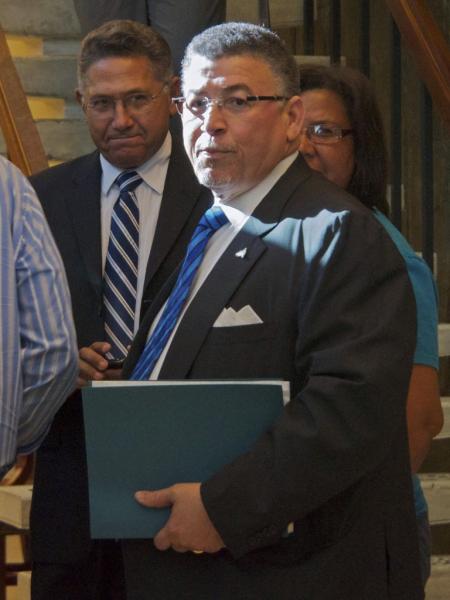
Mac adds to PAC concerns
 (CNS): The opposition leader has added his voice to concerns that the swearing in of two members of the Public Accounts Committee as Cabinet ministers, albeit on a temporary basis, is inappropriate or even a conflict of interest. Roy McTaggart is the PAC chairman and Winston Connolly is a member of the committee that is meant to scrutinize government accounts and spending based on the auditor general’s reports on behalf of parliament and, in turn, the public. However, they will both be spending some two weeks at the management table of government as they stand in for ministers on leave. UDP leader McKeeva Bush said that McTaggart is already conflicted and should not be chair as he is a government member and even more so now he is acting as a minister.
(CNS): The opposition leader has added his voice to concerns that the swearing in of two members of the Public Accounts Committee as Cabinet ministers, albeit on a temporary basis, is inappropriate or even a conflict of interest. Roy McTaggart is the PAC chairman and Winston Connolly is a member of the committee that is meant to scrutinize government accounts and spending based on the auditor general’s reports on behalf of parliament and, in turn, the public. However, they will both be spending some two weeks at the management table of government as they stand in for ministers on leave. UDP leader McKeeva Bush said that McTaggart is already conflicted and should not be chair as he is a government member and even more so now he is acting as a minister.
The appointment of McTaggart and Connolly has added to what is already a delicate political situation with PAC as the opposition leader is the only non-government member now on the committee. Although McTaggart and Connolly are both members of the Coalition for Cayman and not the Progressives, they have both committed to being part of what is being termed as an "inclusive" but not a coalition C4C/PPM government.
Asked about their taking up temporary Cabinet posts while still sitting on the body designed to scrutinize government expenditure, the auditor general said his office did not wish to comment on the situation. However, other sources have raised concerns, including those inside government, about the decision of serving PAC members taking up even short-term roles at the Cabinet level of government.
Bush told CNS that he already had serious concerns about McTaggart’s position, which he had raised at the recent closed door meeting even before he was sworn in as a minister. Emphasising that he would not be “opposition for opposition sake”, Bush told CNS, however, that he would not “shirk his duty” as the opposition leader.
In this case, he said, the appointment of McTaggart as chair while being what is basically a junior minister was "totally against the propriety, good governance and openness and transparency” that the current government had “most vehemently and in every public meeting, advertisement in all media and their manifestos” said they would adhere to. “Are they so doing?” Bush asked rhetorically. “No! Far from it.”
In the first closed door meeting of PAC, which the opposition leader noted should have been open to the public, he said he had made his thoughts known and registered his objections.
“The Commonwealth of which the Cayman Islands are a part — and are told we must adhere to all their and other international standards of proper conduct, its conventions, precedents and parliamentary procedures all dictate that the chair of the PAC must come from other than the ruling government,” Bush said. “And once our Constitution as we have it now had been changed, we, the UDP, agreed to adhere to those principles also.
“It is wrong for Mr McTaggart to be chair of the PAC as he is now part and parcel of the government. It is an abomination to all the Commonwealth stands for, for him to be appointed a minister while he is the chairman of the PAC,” he added.
Bush stressed that during the appointment of the committee when the new parliament was sworn in following the election, he had made recommendations that one of the independent members, either Ezzard Miller or Arden McLean, should or could have been appointed.
“The PPM made sure that would not happen,” the leader of the opposition said. “If they will not support either of those members, well what about Mr Al Suckoo?” he asked. “He is their backbench member and I think is certainly capable of being the Chairman of PAC.”
At the time of McTaggart’s appointment, the C4C member was sitting on the opposition benches. However, soon after Swearing In Day, the second elected member for George Town took up the premier’s invitation to work as a councillor with the finance minister and the financial services minister in the Progressive government.
In the statement announcing the C4C member's decision, Premier Alden McLaughlin had noted that there would be a need to address the PAC situation. However, McTaggart has remained as chair.
Asked about the potential conflict by CNS on Wednesday, McTaggart made no comment on the issue but the premier issued a statement defending the situation for the short term.
“The Public Accounts Committee, for the foreseeable future, will be considering the accounts of the previous administration,” McLaughlin said. “For that period there will be absolutely no conflict of interest on the part of Councillor and temporary Minister McTaggart irrespective of what role he has in the current Government. When the point comes where the Public Accounts Committee is turning its attention to consideration of accounts of the Progressive Administration, I will reconsider this issue of chairmanship of the Public Accounts Committee,” he added.
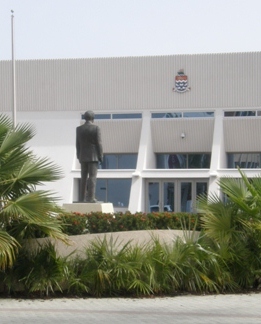
Expert spells out policy for politicians
 (CNS): Ministers, councillors and political advisors in the new PPM government have been attending a number of workshops on government’s policy framework to ensure the proper development and implementation of policies and so that documents outlining the goals and ambitions of government don’t end up gathering dust on shelves. The workshops are being held by Robert Lewis, the director of the Policy Coordination Unit, who held similar sessions last year with civil service management. Cabinet Secretary Samuel Rose, whose office coordinates the development and implementation of government-wide policy, organized the sessions.
(CNS): Ministers, councillors and political advisors in the new PPM government have been attending a number of workshops on government’s policy framework to ensure the proper development and implementation of policies and so that documents outlining the goals and ambitions of government don’t end up gathering dust on shelves. The workshops are being held by Robert Lewis, the director of the Policy Coordination Unit, who held similar sessions last year with civil service management. Cabinet Secretary Samuel Rose, whose office coordinates the development and implementation of government-wide policy, organized the sessions.
“The ultimate aim of policy training is to enhance services to stakeholders and the public by properly developing policies and implementing them effectively,” Rose said in a release from government. “The Cabinet Office is committed to furthering this aim in the public interest and we believe the public will soon start to feel the benefits of this approach.”
Lewis, who holds a master’s degree in Public Policy and Management, said that unless a policy is properly developed, it is likely to be partly implemented, ineffective or shelved.
Pointing to Vision 2008, a strategic national plan that was only ever partially adopted, as an example, he explained that policies have to be championed and steered by politicians, but buy-in from everyone involved, especially key stakeholders, is very important to policy success and, as a result,, there must be a good balance of stakeholders at the table when policies are created. A positive example cited is the new disability policy being developed, where people with disabilities and their support organisations are represented on steering and other committees.
Policy could also stall as a result of over-reliance on expert advice, he warned. If local stakeholders find expert opinion less than credible, based on what they know about their context, chances are they won’t support the policy.
Researchers should also explore what some may view as unforeseen consequences, Lewis said. He explained that when forming revenue-based policies, projections versus actual results where the policy was tried elsewhere, the true cost of administering the policy and any altered behavior it would create or loopholes have to be examined before a decision is made to implement.
Lewis said policies should also be reviewed and evaluation by entities other than implementers to makesure that the end results are achieved and to avoid conflict of interest and encourage accountability.
National policies should have action plans, including who is going to do the work, what the scope of the work entails, the resources needed and when results can be expected, he said. And although national policies may have long term aims, evidence of short-term progress is necessary to show that they are working.
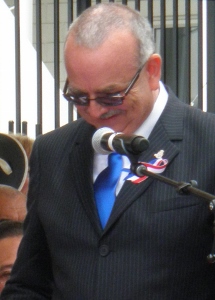
Councillors ‘temp’ ministers
 (CNS): The government has pushed the boundaries on the role of so-called government councillors to a new level as the PPM plans to swear in two C4C back-bench MLAs as temporary ministers while two Cabinet members take leave. In accordance with the constitution, Winston Connolly, who is currently the councillor in the education ministry, will stand in for Tara Rivers for two weeks, while Roy McTaggart (left), the councillor to both the finance minister and minster for financial services, will step in for Marco Archer, the minister responsible for Finance and Economic Development while he takes a ten day break. The political temps will be sworn in during the weekly Cabinet meeting on Tuesday, 20 August, officials said in a release from the premier’s office.
(CNS): The government has pushed the boundaries on the role of so-called government councillors to a new level as the PPM plans to swear in two C4C back-bench MLAs as temporary ministers while two Cabinet members take leave. In accordance with the constitution, Winston Connolly, who is currently the councillor in the education ministry, will stand in for Tara Rivers for two weeks, while Roy McTaggart (left), the councillor to both the finance minister and minster for financial services, will step in for Marco Archer, the minister responsible for Finance and Economic Development while he takes a ten day break. The political temps will be sworn in during the weekly Cabinet meeting on Tuesday, 20 August, officials said in a release from the premier’s office.
This is the first time that temporary ministers are being appointed in accordance with section 53(2) of the Constitution. In the past, another minister was assigned the responsibility of performing a Cabinet colleague’s functions while absent.
“Since November of 2009, our modernised Constitution has allowed for the appointment of temporary ministers, although the provision has never been utilised before,” said Premier Alden McLaughlin.
“Ministers are extremely busy with the responsibilities of their respective ministries and it is difficult for them to take on additional responsibilities when their colleagues are on leave or ill. It is only logical that councillors are appointed as temporary ministers on these occasions. I am privileged to lead an extraordinarily capable team and in keeping with my determination to have an inclusive government, to utilise the abilities of all members of the team in the best interest of the country,” he added.

Anti-corruption guru to headline UCCI conference
 (CNS): Dr Ngozi Okonjo-Iweala, a globally renowned economist and Nigeria’s finance and economic minister, has been confirmed as the keynote speaker of the 2014 International Conference on Ethics, Values and Morality that will be hosted by the University College of the Cayman Islands (UCCI) on 19-21 March next year. Well known for her work on the issue of corruption and the need for transparency and accountability in African countries, Okonjo-Iweala's achievements paved the way for her to serve in Nigeria’s government, where she continues to fight corruption, initiate transparency and establish economic reform to make Nigeria more hospitable to foreign investment.
(CNS): Dr Ngozi Okonjo-Iweala, a globally renowned economist and Nigeria’s finance and economic minister, has been confirmed as the keynote speaker of the 2014 International Conference on Ethics, Values and Morality that will be hosted by the University College of the Cayman Islands (UCCI) on 19-21 March next year. Well known for her work on the issue of corruption and the need for transparency and accountability in African countries, Okonjo-Iweala's achievements paved the way for her to serve in Nigeria’s government, where she continues to fight corruption, initiate transparency and establish economic reform to make Nigeria more hospitable to foreign investment.
Educated at Harvard University and the Massachusetts Institute of Technology (MIT), Dr Okonjo-Iweala is known for her work at the World Bank, where her career as a development economist spanned 21 years and where she held the post of Vice President, Director and Corporate Secretary.
UCCI President Roy Bodden said that securing Dr Okonjo-Iweala was a real coup for the college, taking the conference to the next level.
“While the University College of the Cayman Islands has developed a reputation for its excellent conferences and the calibre of keynote speakers it attracts this next conference takes us to new heights. It is a tribute to the conference director Dr Livingston Smith, his hard working and dedicated organising committee, the University College and its associates, that the Nigerian finance minister and former World Bank director, Dr Ngozi Okonjo-Iweala, has graciously accepted the University College’s invitation to be next year’s conference keynote speaker,” he said.
“To be able to attract a person of such eminence speaks volumes of the respect accorded to UCCI as an institution of higher learning as such invitations are not accepted without proper due diligence being done. As president, I wish to record my gratitude to the board, the institutions which are partnering with UCCI on this Conference and of course the many sponsors and well-wishers,” the president added.
He said that corporate Cayman and the general public could feel proud that UCCI, which a few years ago was suffering from a ‘crisis of confidence’, was finally demonstrating its resilience and value to Caymanian society.
Prospective presenters are being asked to submit a 250-300 word abstract, a 50-word biography, information on university affiliation, if any, and a photograph, if there is no objection to displaying such on the conference website. The deadline for submission is 31 December but full papers are due on 31 January.
For further information, please visit www.ucciconference.ky or contact Dr Livingston Smith, Conference Director at lsmith@ucci.edu.ky or call 623-0539.